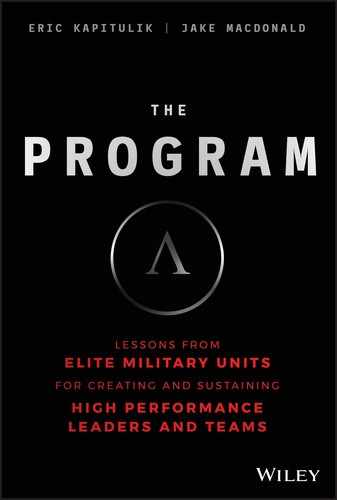37
Leadership Is a Contact Sport
Figure 37.1 Mortar rounds exploding near Captain John Ripley at Dongha. Note: Image courtesy of U.S. Naval Museum and with appreciation to Tom and Steve Ripley.
Colonel John Ripley, Navy Cross Citation: The Navy Cross is awarded to Captain John W. Ripley, United States Marine Corps, for extraordinary heroism on 2 April 1972 while serving as the Senior Marine Advisor to the Third Vietnamese Marine Corps Infantry Battalion in the Republic of Vietnam. Upon receipt of a report that a rapidly moving, mechanized, North Vietnamese army force, estimated at reinforced divisional strength, was attacking south along Route #1, the Third Vietnamese Marine Infantry Battalion was positioned to defend a key village and the surrounding area. It became imperative that a vital river bridge be destroyed if the overall security of the northern provinces of Military Region One was to be maintained. Advancing to the bridge to personally supervise this most dangerous, but vitally important assignment, Captain Ripley located a large amount of explosives which had been prepositioned there earlier, access to which was blocked by a chain-link fence. In order to reposition the approximately 500 pounds of explosives, Captain Ripley was obliged to reach up and hand-walk along the beams while his body dangled beneath the bridge. On five separate occasions, in the face of constant enemy fire, he moved to points along the bridge and, with the aid of another advisor who pushed the explosives to him, securely emplaced them. He then detonated the charges and destroyed the bridge, thereby stopping the enemy assault. By his heroic actions and extraordinary courage, Captain Ripley undoubtedly was instrumental in saving an untold number of lives. His inspiring efforts reflected great credit upon himself, the Marine Corps, and the United States Naval Service.1 Eric Kapitulik met Colonel Ripley while a midshipman and member of the varsity lacrosse team at the United States Naval Academy. Colonel Ripley was a sports enthusiast and loved lacrosse in particular (although he may have told this to every team on campus). In any event, they became good friends, especially when Eric returned to the Naval Academy as a Marine Corps officer. His best friend, also a Marine Corps officer, Doug Zembiec (KIA Iraq 2007) and Eric had the privilege of spending countless hours with Colonel Ripley, prior to his death in 2008. (It was Colonel Ripley who called Eric to tell him that his best friend had died in 2007.) Every interaction with Colonel Ripley was a lesson on leadership. However, the one that Eric and The Program team is constantly reminded of is “Leadership is a contact sport.” Leadership requires us to be present and to interact with our teammates. “Let’s go guys,” has never actually made anyone “go.” “Let’s go guys” has never actually made anyone “go.” Question: How often do we see a quarterback come to the sideline after a three-and-out series, get on the headset with his offensive coordinator, take a sip of water, and then continue to sit in that same spot until it is his turn to get back on the field? Answer: As often as a manufacturing shift manager sits in his or her office for an entire eight-hour shift “managing,” while their teammates are on the floor of the plant working. As often as a principal or mayor sits in his or her office doing paperwork for an entire day, while the teachers or fellow government workers are in their own separate rooms or offices. Instead, as the quarterback, come to the sideline, talk to your coach, get a sip of water, and then walk up the sideline. Pat your teammates on the back. Hug ’em! Managers, leave your cell phone in your office (the paperwork and emails will always be there), walk around the plant or office floor, shake hands, pat people on the back, and communicate with your corporate teammates, fellow teachers, and government employee teammates. Remember Colonel Ripley: “Leadership is a contact sport.” There are a host of reasons why we may not be able to constantly shake hands and pat backs. We must also successfully complete all of the tasks associated with our job’s title for our team to successfully accomplish its mission. Sometimes the quarterback does need to speak with the offensive coordinator for an entire opponent’s possession. Sometimes a corporate manager has personnel “fires” that must be addressed or deadlines that may preclude them from doing so. Marketing managers must market and manage. A director of sales must direct sales. However, regardless of the battlefield, as a leader (someone who has influence and has an ability and desire to use it), if at any time you are frustrated, angry, upset, or worried, if you are facing adversity and feel the corresponding stress associated with it, know that your team has those same feelings. In those moments, we must remember that that is when our teams need our influence, that is when we must remember “Leadership is a contact sport.” It is how we maximize our influence and ensure our team’s ultimate success. The Program has the privilege of working with more than 150 athletic and corporate teams annually. These teams range in size from very small to having a worldwide footprint; they may be entirely located in a one-room office or have hundreds of offices around the world. There are indeed factors that make it more challenging for leadership to be a contact sport. More challenging, but not impossible. Impossible is blowing up a steel bridge with 500 pounds of explosives, while the enemy shoots at you and you climb hand over hand placing the explosives. Colonel Ripley blew up the bridge. We can shake our teammates’ hands. Leadership is a contact sport.
Note
